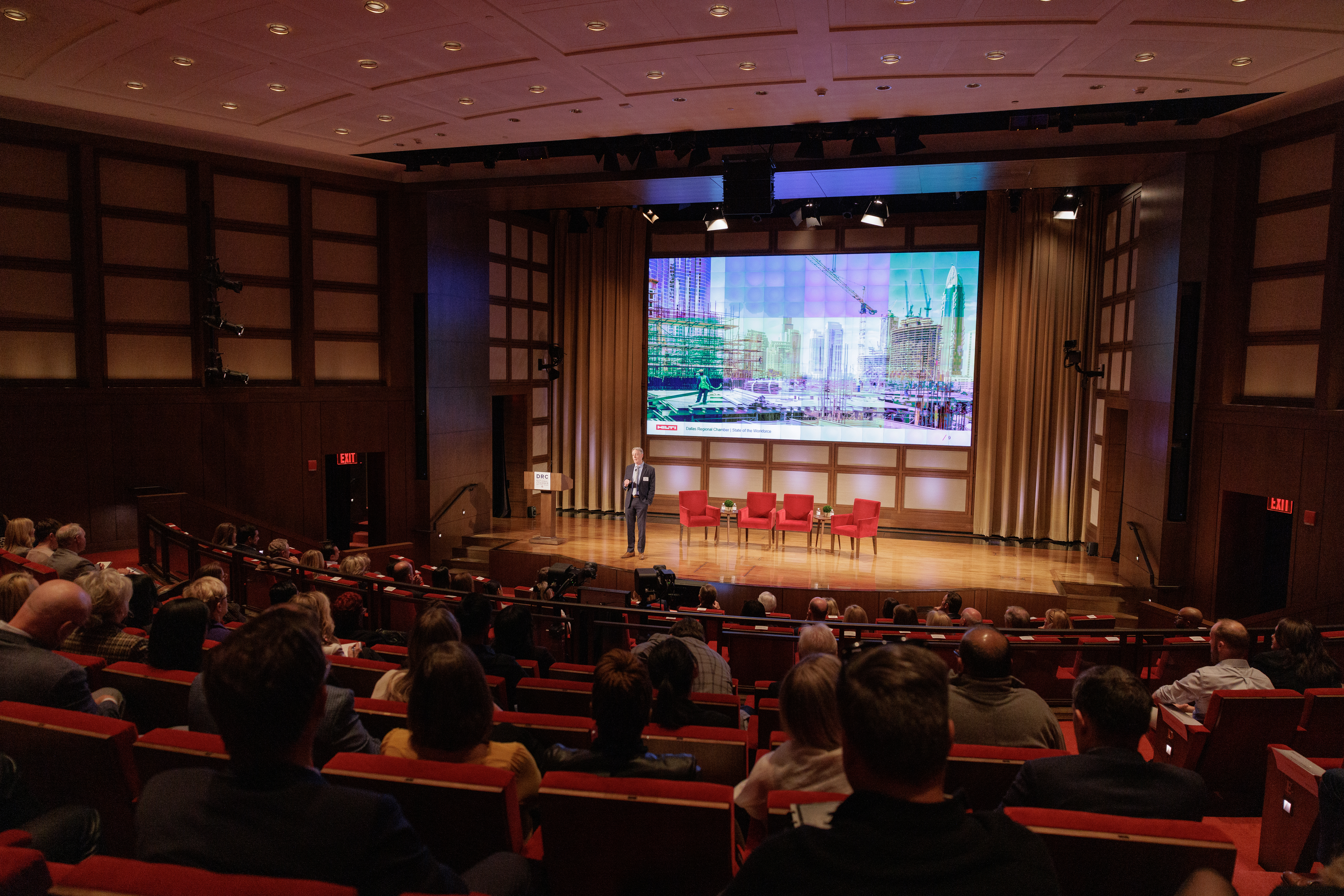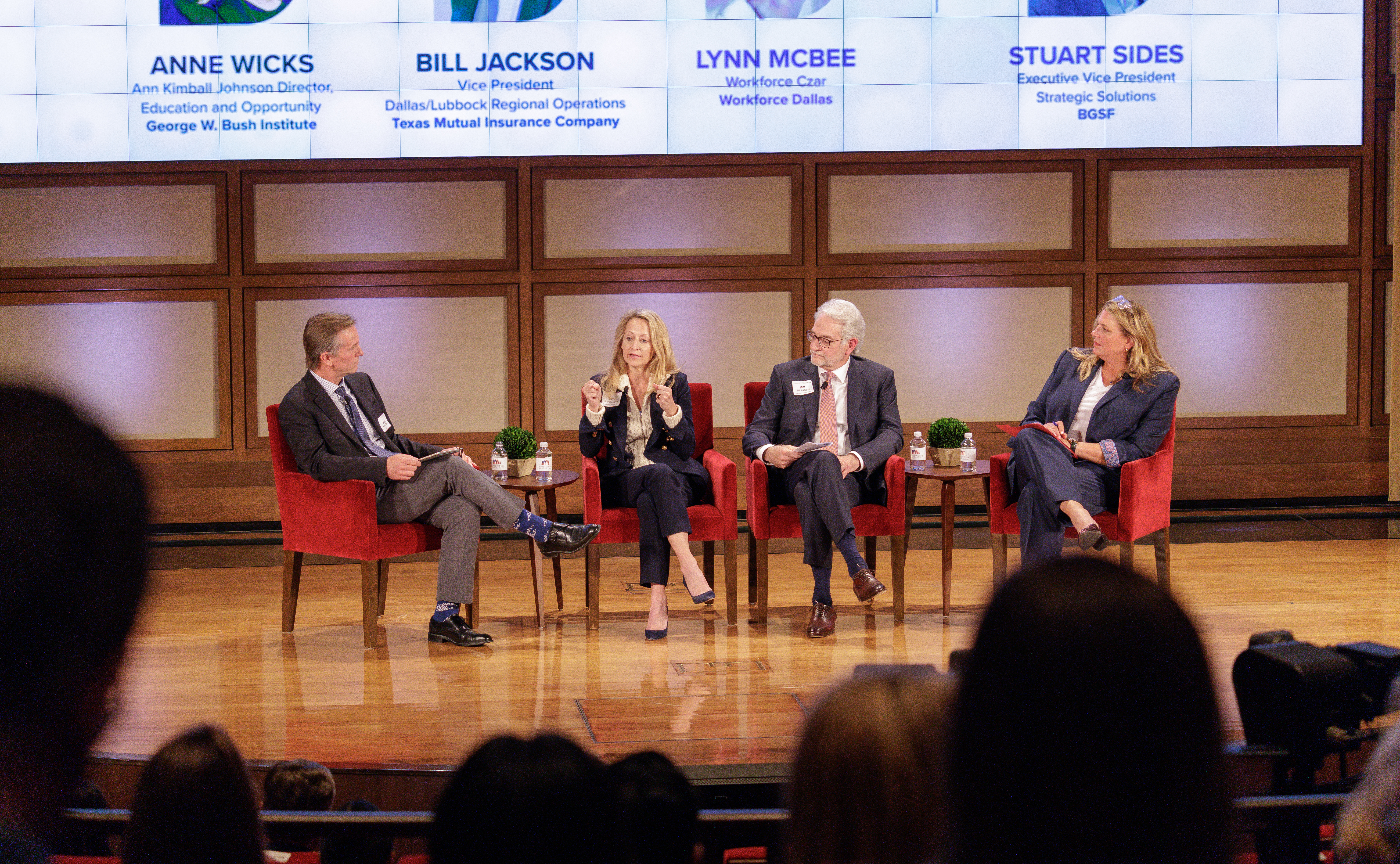By Catie George, Manager, Communications and Storytelling
The Dallas Regional Chamber (DRC) hosted the fourth annual State of the Workforce, co-presented by BGSF and Texas Mutual Insurance Company, on Tuesday, Nov. 14, to hear from local experts on workforce development in the Dallas Region.

“The intersection of economics and education is where workforce development sits,” said Ken Hersh, President and CEO of the George W. Bush Presidential Center. “So, this is a very important topic that I’m glad that the [DRC] and all of the people here are taking seriously to try to find ways to move forward.”
The keynote address by Hilti North America’s CEO Mike McGown focused on how Hilti’s emphasis on culture strengthened their hiring and training practices.
“Culture at Hilti is unique. We see it as a competitive advantage. We spend $10 million annually on culture development,” said McGowan. “We believe that all companies have a culture, but sometimes the culture may not be what you want it to be, so we’ve decided what we want our culture to be. It’s a values-based organization. We teach our team members that their work is worthwhile.”
This culture-first approach contributes to Hilti’s 91% retention rate of talent. This high retention is important in any industry, especially construction.
“The average tradesperson in the construction industry in the United States is 56 years old, and about every three years, it goes up by a year. The problem is there are not enough young people entering into the trades,” said McGowan. “The construction industry generates 15% of global GDP and employs 10% of the global workforce.”
McGowan emphasized the solution is held within the industry itself. There are plenty of opportunities in the industry for anyone willing to try it.
“Construction is a great equalizer. In other words, people who don’t have access to a traditional education can go and apply themselves, learn a trade, and make a great income,” said McGowan. “In fact, many electricians today make more than engineers and accountants who are graduating from college.”
Another key to retention is consideration for diversity, equity, and inclusion within the workplace.
“We know that fundamentally, to be a successful company, you’ve got to have diversity, and you have to have an inclusive environment that welcomes everybody for who they are and celebrates that diversity to help ensure that we look at problems from all different perspectives and make better decisions and better outcomes,” said McGowan.
McGowan left the audience with some advice: focus on culture.
“It takes effort. It can’t be a one-time event,” said McGowan. “It has to be an ongoing process. We call it a journey, our culture journey. But I think that the money that you spend [on culture], you get back tenfold.”
Following McGowan’s keynote, the panel discussion, moderated by Executive Vice President of Strategic Solutions at BGSF Stuart Sides, further explored current labor shortages and the need for a qualified workforce.

“If you think about every 8th grader right now in the state of Texas, only about 22% of those 8th graders will go on after they graduate from high school to get a two- or four-year degree or credential of some kind to help them get a solid wage job. But we know by 2036, 70% of jobs in Texas will require some sort of credential, two or four-year degree, or something after that,” said Anne Wicks, Director of Education and Opportunity at the George W. Bush Institute. “The challenge in front of us is how do we make sure Texans are ready to access that kind of opportunity and keep our economy moving.”
Promising changes are being made to accommodate more non-traditional workers, who are essential to solving current gaps in the workforce .
“Years ago, people would not look at second-chance job seekers, but now they will,” said Lynn McBee, Workforce Czar of Workforce Dallas. “So, it’s a different day, and we’re excited about the potential of the future.”
However, there continue to be challenges to consider.
“I’d also ask all the leaders here to think about child care allowances. That really is a big burden to people working and to retaining employees to keep them happy,” said McBee. “Some type of child care allowance or onsite child care [contributes to] culture and people staying.”
The panel emphasized the importance of utilizing partnerships throughout the Dallas Region moving forward to address all the challenges discussed.
“Listen to your employees, and understand what they need,” said Texas Mutual Insurance Company Dallas/Lubbock Regional Operations Vice President Bill Jackson. “Do not be afraid to reach out to other businesses. Tackle the problems and collaborate, find those great nonprofit partnerships, and be a force for good in workforce development because it will benefit not only your industry overall, but you as well. That lifts all boats.”
Thank you to our gold sponsors, Bank of America and Hilti North America, and our silver sponsors, Dallas College, Forvis LLP, and Oncor. And thank you to our reception sponsor, PNC Bank.
To learn more about the DRC’s work on Education, Talent & Workforce, visit our website.